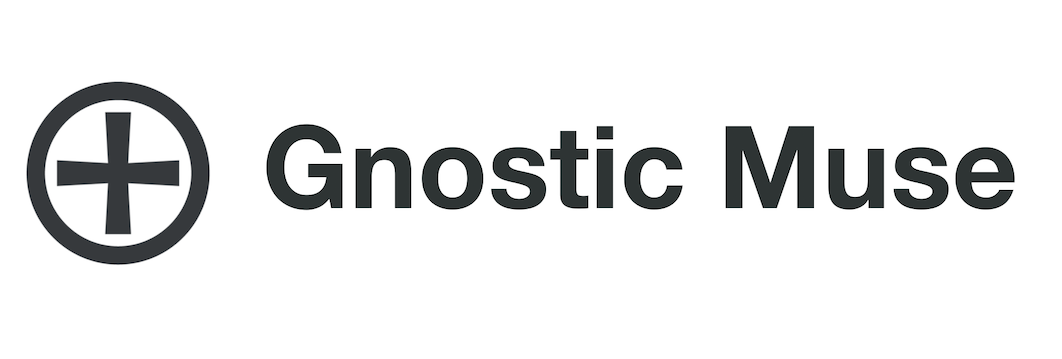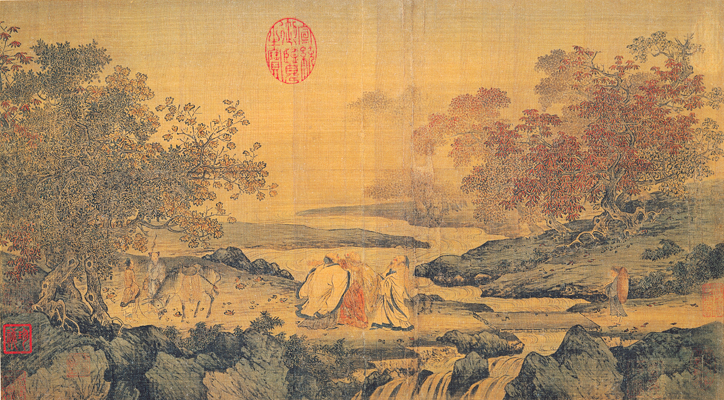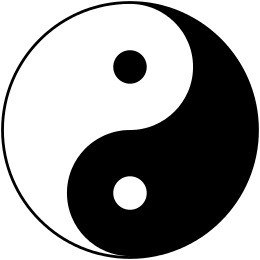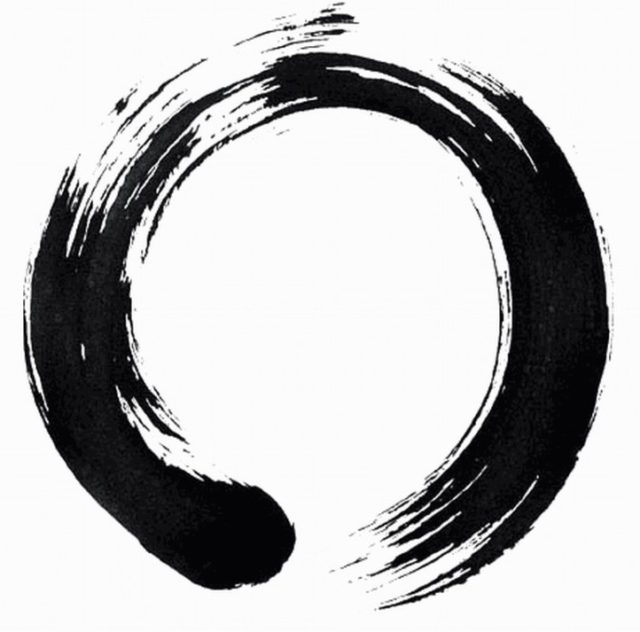 “Tao is empty- Its use is never exhausted
“Tao is empty- Its use is never exhausted
Bottomless- the origin of all things…
Deeply subsistent-
I don’t know whose child it is.
It is older than the Ancestor.”
-Tao Te Ching, 4
“Tao called Tao is not Tao.
Names can name no lasting name.
Nameless: the origin of heaven and earth.
Naming: the mother of the ten thousand things”.
-Tao Te Ching, 1
“Any name of God which is found in the Bible can not be applied to the Deity prior to His self-manifestation in the Creation, because the letters of those names were produced only after the emanation… Moreover, a name implies a limitation in its bearer; and this is impossible in connection with the ‘En Sof.”
-The Sephir Yetzirah
“Before He gave any shape to the world, before He produced any form, He was alone, without form and without resemblance to anything else.”
-The Zohar
Tao, the true God beyond all creation cannot be named. Tao is the same as the Logos of the Greeks, Ptah of the Egyptians who created with his mind and his word, the Ain Soph Aur, or Absolute, in the Hebrew kabbalah. Tao is also the void nature within ourselves.
To know tao, to know our spiritual aspect, we must understand the nature of the universe which is manifestation and multiplicity, and also in its deepest nature, it is unity and pure un-manifestation. We have a spiritual essence within us, that is very well hidden deep within our personalities and our very dual nature. The path of awakening of the consciousness is discovering for ourselves the nature of tao, the nature of the very center of everything.
Tao as a way or path is this process of letting ourselves settle more and more inwardly, and this always leads us closer to the truth, to our absolute nature.
Creation and the Tao
“Tao engenders One
One engenders Two,
Two engenders Three,
Three engenders the ten thousand things.
The ten thousand things carry shade
And embrace sunlight.
Shade and sunlight, yin and yang.
Breath blending into harmony.”
-Tao Te Ching, 42
In this passage from the Tao Te Ching tao is an un-manifestion engendering the one, called wuji the infinite space. Wuji is stillness within stillness, inner stillness, inner essence, beneath and interior to any movement.
The one engenders the two, called taiji, the great ultimate, related to harmony of opposites and alchemy of yin and yang. The two engenders the three, the law of three which creates, and from the three all of creation, the “ten thousand things”.
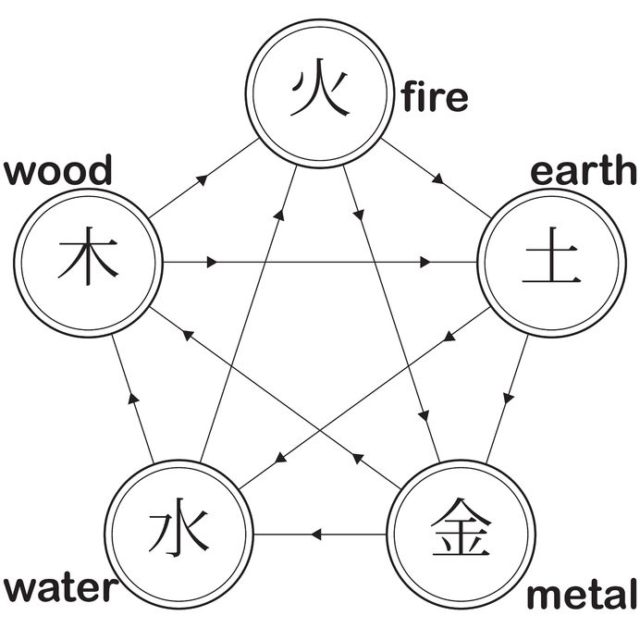
The Five Phases and the Pentagram
Every soul descends from tao into wuji and fuses with the five phases, the wu jing shen. The five phases are the symbol for the movement of the energies and elements of nature: fire, earth, metal, water, and wood.
The five-pointed symbol here represents the flow of energies in nature. The five phases are not discrete elements like the four elements of classical Greece, but phases of nature which transform into each other in a cyclical way. These five phases are the basis for Taoist medicine and feng shui, the sciences related to health and harmony in life and nature.
In many Western spiritual traditions the five-pointed pentagram represents the energies of nature directed toward Heaven and the completion of a spiritual work. In Hinduism the five pointed star represents the Pancha-mahabhuta, or the sacred 5 elements, which are the four classical elements plus spirit, or ether.
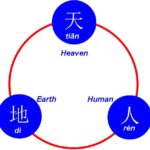
The Cosmic Trinity
Tao engenders the three treasures in different scales of existence, each with its own science for mastery.
Heaven is the cosmic scale with the Sun, Moon, Stars and its science is astrology.
Earth is the terrestrial scale with Wind, Earth, Water and its science is feng shui, or geographic physiognomy. The Earth transforms the cosmic energy flowing from Heaven through the web of interconnected life on its surface.
Human is the microcosmic scale and has the internal jing, qi, shen, the essence, energy, spirit. The human transforms cosmic and terrestrial energies through the science of alchemy and transmutation.
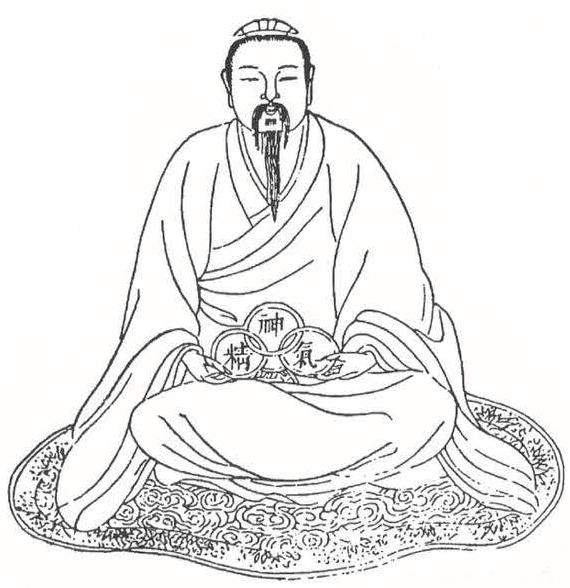
The Human Trinity
The three treasures of humans are the jing, qi, and shen.
Qi is the term for “energy” in the body, and also in all of nature. Qi is movement and functionality, life force. Qi is equivalent to the Hindu prana and the Greek pneuma, the breath. When the qi is exhausted the separation of yin and yang occurs and life ends.
Jing is the sexual essence, the root of the qi in our body, and the force that can generate new life, or with special efforts, regenerate us spiritually. Jing is related to our DNA, our instinctive animal nature to survive and reproduce.
Shen is the spirit, or translated literally as “heart-mind”. Shen resides in the heart and is nourished by the blood, or vital fluids in the body. Shen is expansive and connects us to our true nature, beyond the body.
Qi is the mediator between jing and shen, matter and spirit. The goal of spiritual alchemy is to transform the jing into shen, sexual transmutation of our base force and power into spiritual enlightenment. In Taoism it is said that we currently, as unenlightened people, have only yin bodies, or lunar bodies. With the transformation of jing-qi-shen we create yang bodies, or solar spiritual bodies.
Spiritual training entails the cultivation of wisdom, love and power. Wisdom is gained through experiencing the void through meditation, our own void nature. Love by knowing the light of the shen, the light within our hearts. To experience and know Love as the first law of creation. Power is gained through transmutation practices, cultivation of virtues, etc.
“Whoever lights the fire in the central mountain range (spinal column) erects the temple (builds the solar bodies) and enters into harmony with the Tao (incarnates his Being).”
–Samael Aun Weor, Buddha’s Necklace
“Reversal is Tao’s movement.
Yielding is Tao’s practice.
All things originate from being.
Being originates from non-being.”
-Tao Te Ching, 40
